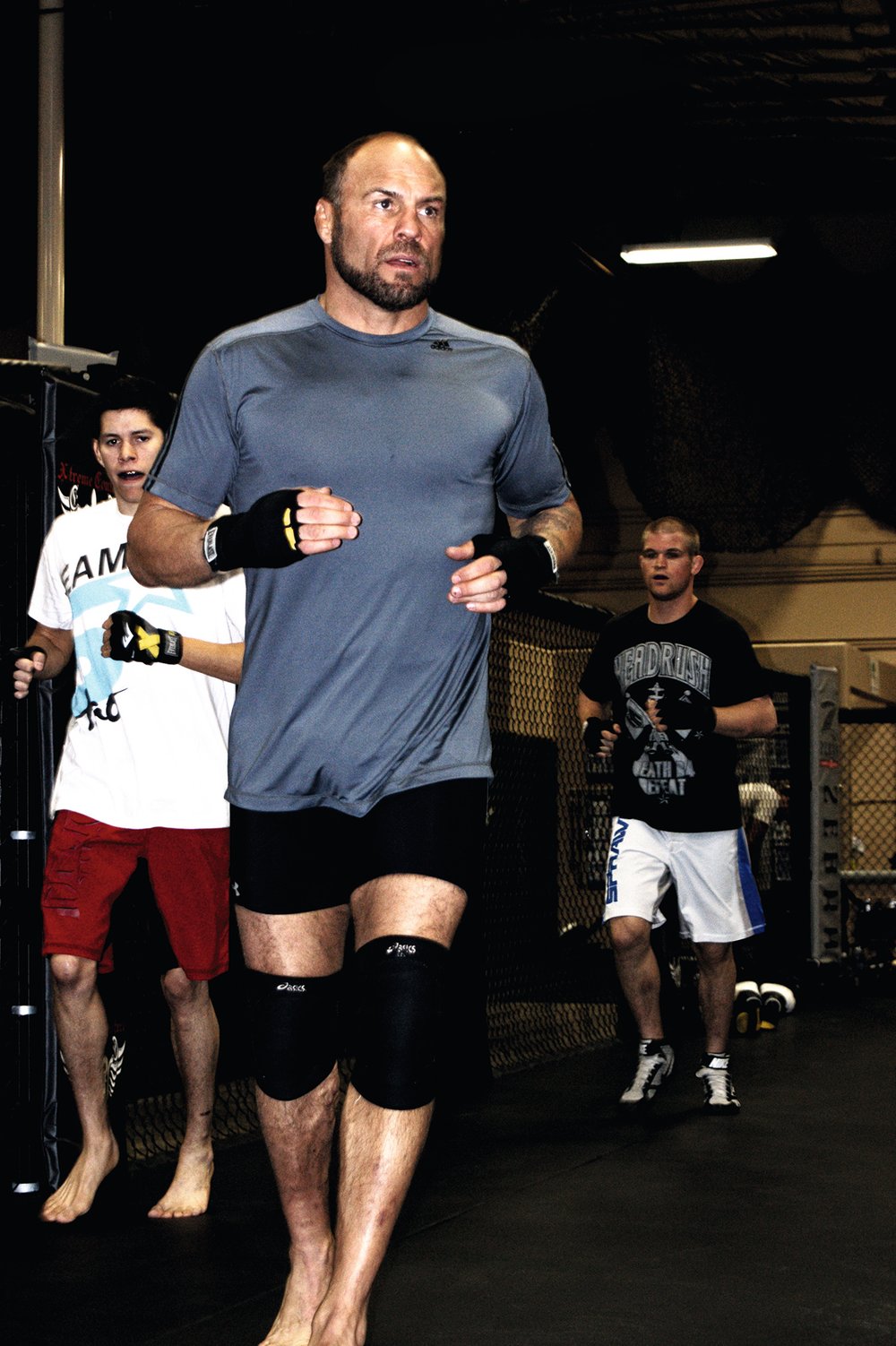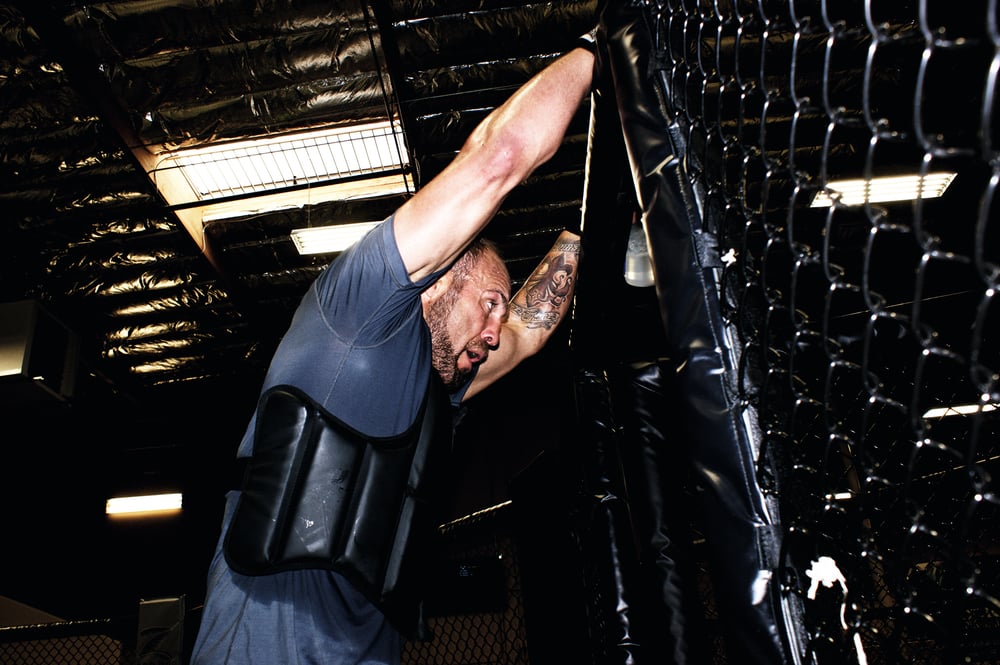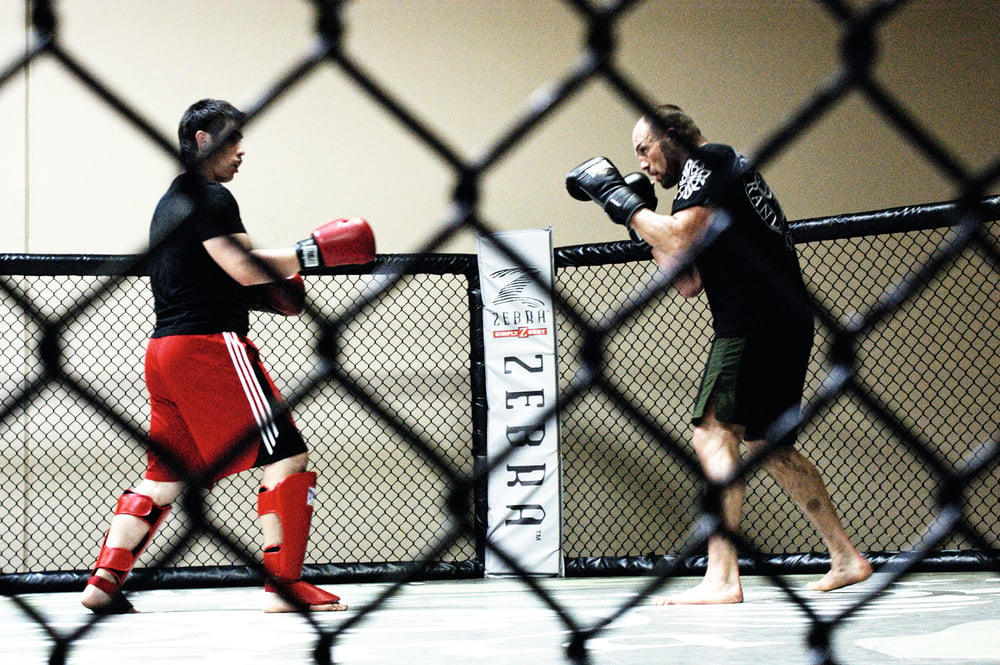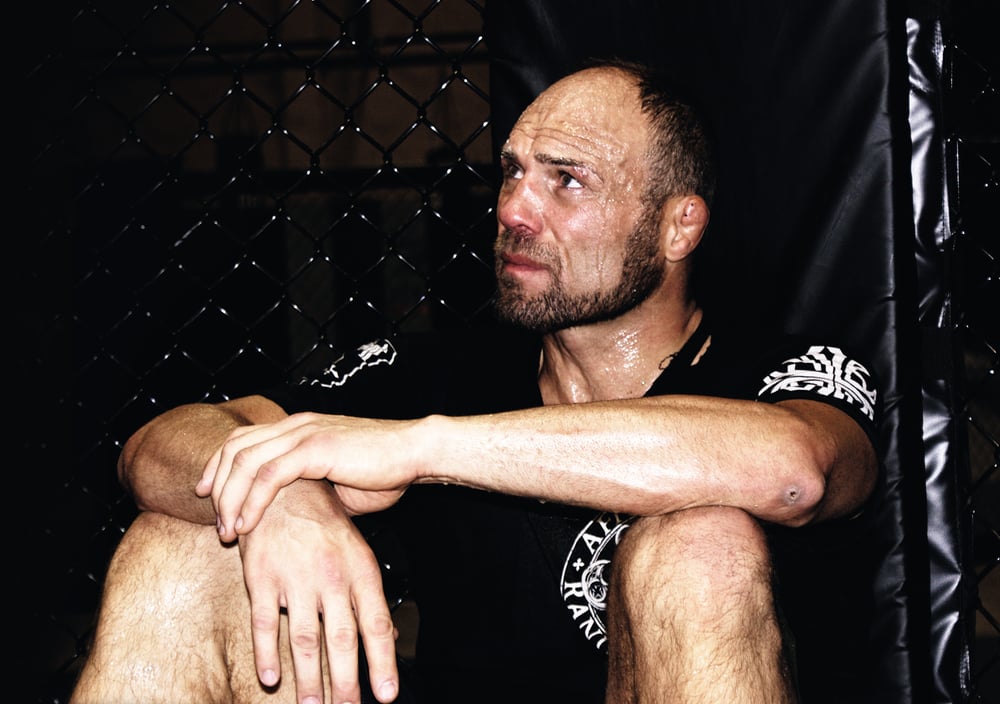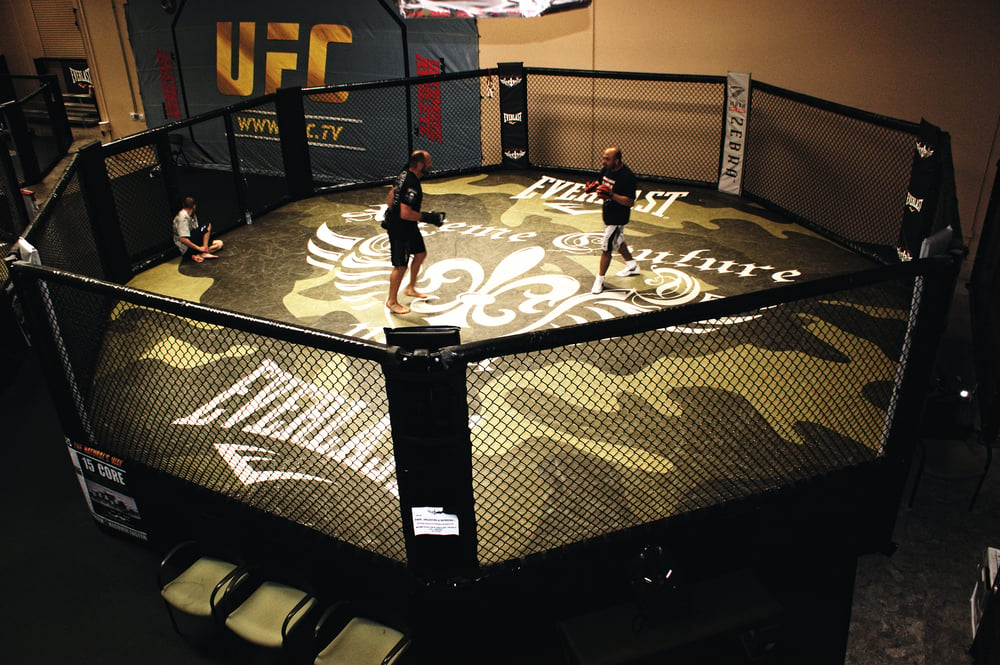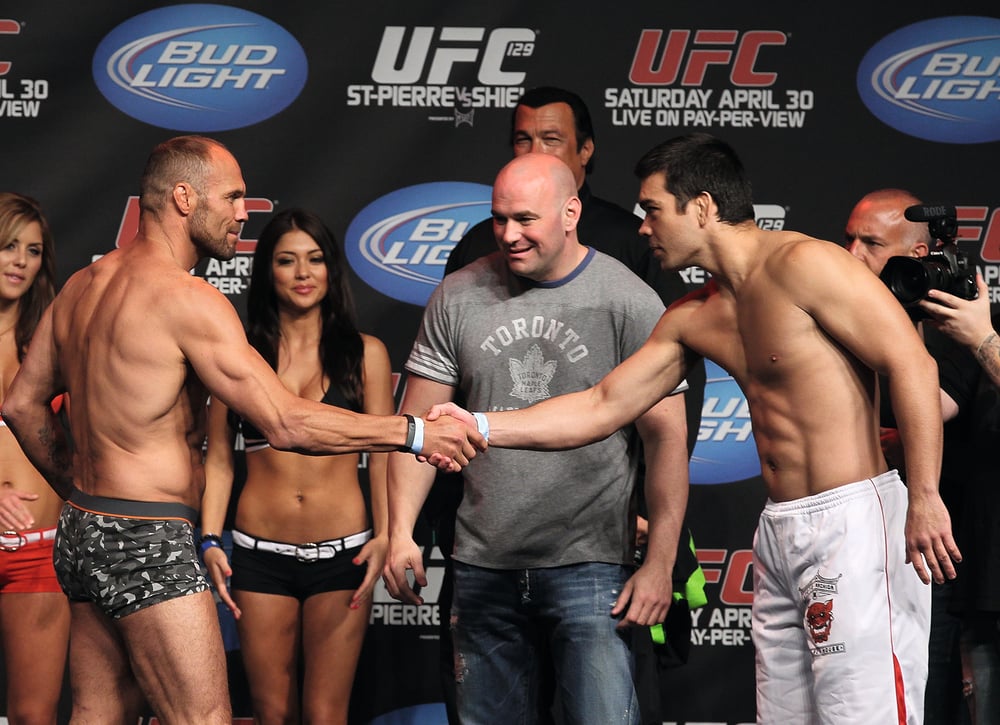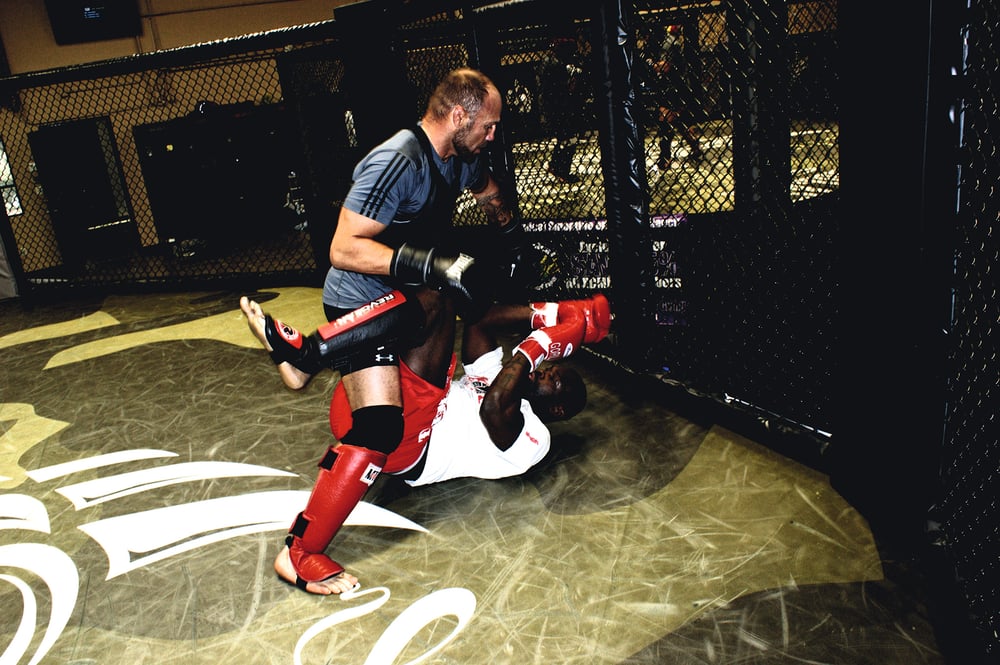
Issue 078
August 2011
After an amazing 14-year career, ‘Captain America’ left the cage for the final time at UFC 129. Here, Fighters Only presents an exclusive insight into Randy Couture’s final fight camp.
Nine weeks before his UFC 129 fight with Lyoto Machida at Toronto’s sold-out Rogers Centre, UFC Hall of Famer Randy Couture started training camp for the 27th and final time of his legendary career.
Like his previous efforts, Couture approached the training as a consummate professional – dedicated, focused and intent on perfection in each and every session. Yet Xtreme Couture coach Ron Frazier, who’s worked almost daily with Couture for the past six years, said it was immediately apparent something was just a little different.
The End
“He was a little bit quieter in camp than he normally is,” Frazier told Fighters Only. “Something was just a little different. I was thinking he might be getting close to calling it a day so I wasn’t surprised when he said this was probably it. In the gym, I think he was a little more introspective than even he realized he was. When you’ve watched him on a daily basis for five or six years you pick up on some little things. I was just thinking something was a little different. It wasn’t in a bad way or that would affect his performance or anything like that. It was just that something was a little different and it made me think he was getting close to the end.”
As it turns out, he was. Couture admits he knew even before that first day of camp the fight with Machida would represent his final appearance in the cage. Frazier said that as training started in earnest, ‘The Natural’ didn’t make any official announcements to his Las Vegas-based team. But Frazier said he and fellow Xtreme Couture coaches didn’t need to hear the 47-year-old say he was ready to hang up the gloves. With a budding movie career, a chain of successful gyms and a number of other projects in the works, Couture simply had enough going on outside of the cage that it was becoming impossible to put all of his focus into his time inside of it.
“He’s 422 years old,” Frazier joked. “You can’t do this forever. He wrestled with the Greeks when they were naked. At some point, you’ve got to call it a day. I think everybody came to their own individual recollection of realizing this was going to be it without Randy having to say it. I personally thought leading into the James Toney fight he probably had one more fight in him.
“He’s still able to go physically, but at some point, as an athlete, if the physical part doesn’t break down, the mental part starts thinking, ‘Do I want to sacrifice the things I have to sacrifice to do this anymore?’ – especially when he has so many other options. He doesn’t have to get in there and fight. He can be an ambassador of the sport and be involved in the sport heavily. He has a new passion in making movies and he has his gyms and all these young fighters he can help. Obviously, with his son starting to come into the ranks, he wants to be around and sit back and watch his son instead of maybe taking away from what his son is doing.”
Quite simply, it wasn’t the physical toll of MMA that led Couture to call it a career. That much has always been evident, and it remained true in the first days of training. Sure, there were some early challenges, but Couture said that’s always to be expected.
Training camp
“I enjoy camp every time, and this one was no different,” Couture said. “You start out, not frustrated, but you start out scratching your head going, ‘Dang it. This isn’t going right.’ You try and figure out what you need to do and what skills you need to sharpen. I work with my staff, coach Gil Martinez and coach Neil Melanson, and kind of ferret that out.
“The beginning, the first two or three weeks of camp, that’s always a challenge. You kind of have to be patient, stick with it, keep toeing the line. The last three weeks of camp, it all starts falling in place and coming together.” Despite the early hiccups, Frazier said there were no major adjustments to make from the approach used in past camps, other than offering the specific tactics for fighting a karate master like Machida.
“I think the Randy that at 47 years old fought Machida would have kicked that Randy that came in at UFC 13’s ass because he’s added so many more tools to his game and he’s so willing to learn,” Frazier said. “Yeah, maybe he’s slowing down a little bit, but he’s got so many new tools that he never had, and that helps compensate. And he’s always gotten by on being a great technician and really smart – not necessarily on athletic ability. You don’t have to make too many adjustments to his training as far as his age is concerned.”
Father time
With age also comes wisdom, and Couture admits one of the most valuable lessons he has learned in an incredible 14-year career was the importance of paying attention to his body’s needs. “I’ve learned that I can do less,” Couture admits. “I have so much muscle memory in this body from years and years of training in combative sports and I can get away with doing less. I’ll get my rounds in and not go do a bunch of the other conditioning stuff because I really don’t need to. I was working out twice a day. To go do more is almost detrimental to me at this stage in my career.”
Essentially, Couture explains, a successful training camp is about time management. There’s no shortcuts to preparation, but it’s better to go full-speed in smaller bursts than to spend hours at a gym working at a more moderate pace.
“Fighters have a tendency to do 100% of everything,” Couture said. “There is no 50% in this sport. I’d rather come in and get a good hour, hour-and-a-half of 100% than try and stretch it to two hours and really kill myself. Taking a day off every now and then is important too. A lot of times I’ll take that wrestling day off. I’ll get my morning workout in, which is generally my hardest strength and conditioning workout, and then I’ll be done for the day and I’ll come back on Thursday for sparring fresh and ready to go and get a good workout.”
And so as the weeks rolled on Couture made sure to keep himself healthy and ready to fight. Sporting a physique most men half his age would envy, the lifelong athlete managed his body from day to day. However, the bumps and bruises associated with preparation for a cage fight weren’t any worse than previous sessions, Couture says, even though a June date just 10 weeks after the fight would signal his 48th birthday.
Injury niggles
“Every fighter, no matter how old they are, is dealing with those things on a regular basis,” Couture said. “You always have something that’s tweaked, something that’s a little swollen or a little bruised. You’ve got a scratch here or a blister there. We all have that stuff – every single person that fights.”
Frazier echoed Couture’s sentiments while marveling at the 30-fight veteran’s overall health after a lifetime of hand-to-hand combat. “Physically, he’s never had any catastrophic injuries,” he says. “He’s never had a knee injury or a shoulder injury or anything like that. He ended up breaking his arm against Gabriel Gonzaga, but other than that, he stayed away from those catastrophic injuries that tend to derail careers. He stayed remarkably healthy, especially later on in his career. He knows what his body will allow him to do, and I think that was the biggest thing for the latter part of his career – making those adjustments to what his body would allow him to do.
“He learned that if he can only hit it hard for half of a day, then hit it hard for half of a day and call it a day. That’s when you start making mistakes in the gym that may cost you in a fight. You push past that point of no return on your body, and he’s been very smart about it the last three or four years. When I first met him, he wasn’t quite there.”
Couture’s lead training partner for the camp was a natural Machida clone: Cezar ‘Mutante’ Ferreira, a Brazilian southpaw with a karate and capoeira background who trains under Xtreme Couture’s Vitor Belfort. Frazier admits there were some early challenges as Couture tried to adjust to the unique movements of a karate stylist, but things were clicking in the final days before heading to Toronto.
Wax on, wax off
“The last few days, Randy was really, really taking it to Cezar, which is something that honestly wasn’t always happening before,” Frazier admits. “Cezar was at some points getting the best of him. Even though the retirement announcement was out there for a while, I think over the last couple of days there was a little light that kind of went off that, ‘Hey, if this it, let’s put on a show.’ I’ve never worried about how Randy has looked in training from day to day because it doesn’t matter. You know he’s going to bring it in the fight, regardless, but he was really looking sharp in those last few sessions.”
Couture also said he felt in perfect form over those final few practices. “The last couple of weeks, the footwork was coming together,” Couture said. “The combinations I was working on, I was getting. The submissions and the situations I was expecting, it was all kind of clicking and coming together. My weight was right where I needed it to be, and my conditioning was great for the fight. I expected the fight to be fun. “It was a great camp – well-directed, and I knew where I needed to be and what I needed to do to get in shape and be ready for the fight, just like all the others. This one wasn’t any different, other than the questions about retirement. And I guess that’s not even a lot different other than I was answering them a little different.”
The fight
Unfortunately, things didn’t go Couture’s way on fight night. Fifteen years younger than his opponent, Machida was in vintage form. His trademark elusiveness left Couture unable to secure his trademark ‘dirty boxing’ attack, and an astonishing leaping front kick sent ‘Captain America’ crashing to the floor early in the second round. It wasn’t the storybook ending for which so many loyal Couture enthusiasts had hoped. The man who had beaten the odds so many times before was simply overmatched, and he confirmed his retirement after returning to his feet.
Of course, all is not lost for Couture. Hollywood awaits, and Couture already has a handful of films in various stages of production. And though his competitive career is finally over, his training is most certainly not. Back in the gym not more than a week later to help his son Ryan prepare for his third professional fight, Couture said he doesn’t ever envision a day when MMA training isn’t a part of his routine. “I think I’ll always train,” Couture said. “I think it will always be a part of my life. It’s a big part of the movie industry is your appearance and how you look, so training is a big part of that. Besides, it’s part of who I am, and it’s where I feel comfortable. It’s my stress reliever. The world goes away when you walk through those doors and put on those gloves.”
His legacy
When Couture entered mixed martial arts in 1997 he had precious little knowledge of how to approach training in the sport. By the time he hung it up an incredible 14 years later he had perfected the science of practice and remains revered as one of the greatest athletes and coaches in the history of the sport.
“It’s changed a lot for me,” Couture admitted. “In the beginning, I never had a staff. I did everything myself. I was kind of amalgamating or using other programs from Olympic Training Center to the national team to Oregon State and the guys down there. I just changed them or modified them to fit MMA. I used the basis of those strength routines, the conditioning routines, on my own. When I moved to Las Vegas, I really started to assemble a striking coach, a grappling coach, and that staff of guys that could help me sharpen all the appropriate tools for each opponent.” And while Couture didn’t always come out with a win, he fought in an astounding 15 UFC title fights. His 19-11 career mark won’t go down as the best, but his heart, honor and commitment to the process will.
“It’s the end of an era,” Frazier said. “Some people have mentioned that it’s like Wayne Gretzky or John Elway retiring. You know what? They’re right. I never really thought of it in that magnitude. When you’re in the moment and you’re involved with it, you don’t really think about it, but I’ve had a chance to reflect on it, and it’s been a great ride.” And it’s a ride that is finally – officially – over. “I’m fine with it,” Couture finished. “I was contemplating retirement for awhile, and this just seems like the right time for me.”
Two-a-day practices, six days a week
“It’s been the same just about for every camp for quite a while now,” Randy Couture said during his camp for Lyoto Machida. “Monday, Wednesday and Friday are strength and conditioning days with Jake. We periodize that so it peaks me at the right time. Tuesday, Thursday and Saturday are with Gil [Martinez]. We always spend a lot of time sharpening the footwork and those combinations for whatever each opponent dictates and whatever skills we need to sharpen for that. Mondays and Fridays are with Neil on the ground, grappling and doing ground-fighting tactics and techniques.
“Tuesday and Thursday are the big sparring days, usually – come in and strap it tight. The whole gym spars that day, so you better have your junk tied on tight. Wednesday is wrestling day. Wednesday afternoon is the day that our wrestling coach Brian Keck runs the practice, and you don’t even have to wear gloves. A lot of times we’re wearing wrestling shoes. It’s more of a pure wrestling practice, which is a whole different intensity. It’s great for a lot of the guys that never experienced that.
“That’s pretty much the week. Mornings are more strength and conditioning oriented and tactics, while the evening is more of the sparring and fight situations.”
Randy's Machida camp training plan
- Monday am: Strength & conditioning, pm: Grappling
- Tuesday am: Stand-up, pm: Sparring
- Wednesday am: Strength & conditioning, pm: Wrestling
- Thursday am: Stand-up, pm: Sparring
- Friday am: Strength & conditioning, pm: Grappling
- Saturday am: Stand-up
Q&A: Jake Bonnacci strength and conditioning
Was there anything special about this camp relating to Randy’s pre-fight talk of.retirement?
“When you know they’re gonna hang it up after the final event, it’s pretty special being a part of it. It was a great camp too. As far as the strength and conditioning aspect things were really dialed in well with him and he seemed to peak at the right time. Everything went the right way with his training, it’s just the fight didn’t go the way we wanted. But no excuses going in, he was in great shape.”
Do you feel you owe Randy Couture anything?
“I owe Randy Couture my career. If he hadn’t given me the opportunity with his open-mindedness to let me come in and train him then maybe I would have never got the chance to work with such an elite fighter. I owe everything to Randy.”
What did you change in Randy Couture?
“I made Randy a better athlete. When I first started working with him at the beginning of 2007, in terms of overall athleticism – speed, footwork, agility and movement – he wasn’t even in the top 20 athletes I’ve worked with. That all came along right up to the last camp.”
Tim Credeur, Randy's teammate
“During my time at Randy’s Academy, I sparred, drilled, wrestled, laughed and talked fighting with Randy many times. He was a multiple world champion and I was a nobody, but he treated me like an equal and changed my entire outlook on the sport and on what it is to be a legend. I consider myself blessed to have experienced a true legend of our sport in such an amazing capacity”.
...

